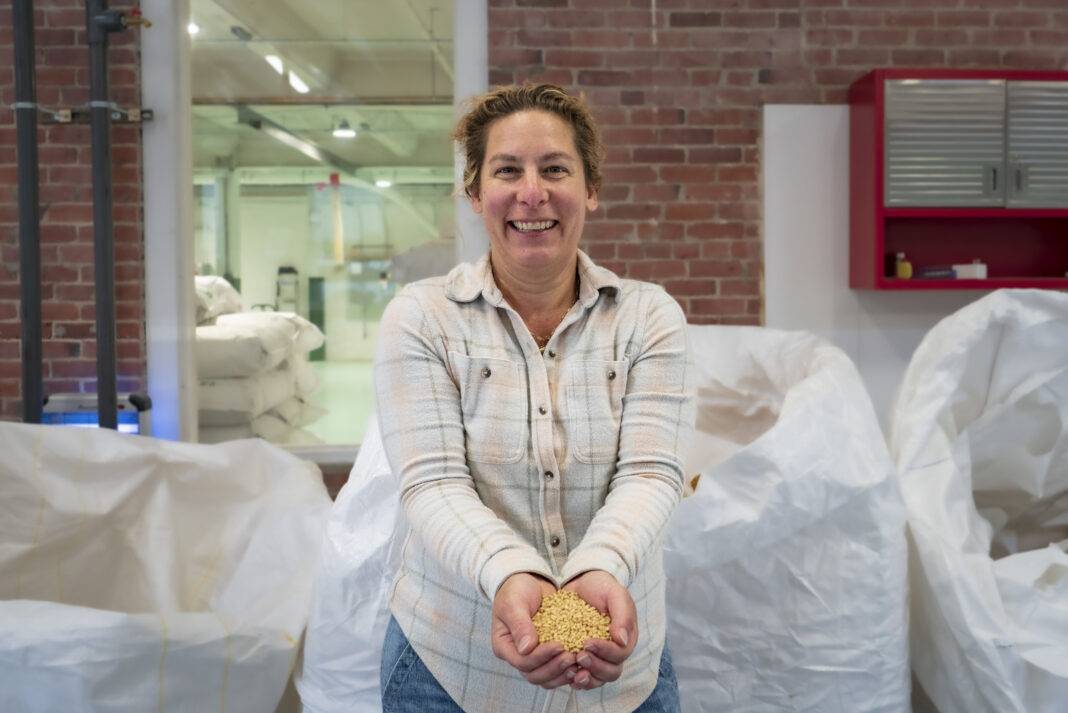Ground Up, a producer of stone-milled flours in Hadley, started simply enough in 2018. “A baker we really respect and love asked us to be his miller,” recounts Andrea Stanley, who owns the business with her husband, Christian. The Stanleys had been producing malt for craft breweries through their company, Valley Malt, since 2010. Stanley says she and her husband said yes to Jonathan Stevens, co-owner of The Hungry Ghost Bakery in Northampton, largely because he told them about flour mills they could buy from New American Stone Mills in Vermont.
“For a lot of us small food processors, equipment of the scale we are at is really hard to find,” Andrea explains. “Knowing there was a mill manufacturer 200 miles away that we could visit with, talk with, made it such an easy process. All of that made it easier for us to say yes to essentially starting a second business.”
Stanley, a former educator and social worker, and her husband, a mechanical engineer, are self-taught as maltsters and millers. Although she acknowledges that neither of them really knew what they were doing when they started Ground Up, she notes that “Milling grain is a lot simpler than malting.” And they already had a wide network of experts to help them learn the basics.
“We applied everything we had learned as maltsters to milling,” she says.
Having a consistent source of excellent grain is vitally important for ensuring the quality of the flour. Because the couple had been running Valley Malt for a decade, they already knew the local suppliers they could rely on for flour-quality grain. This “turnkey” supply of grain, Andrea explains, was another key to the creation of Ground Up. Then came process control, training staff, and seeking feedback from a handful of trusted bakers. “It’s a much richer relationship than just transactional,” Andrea says of the give-and-take Ground Up has established with some of its baker clients.
Aditya Sastri, head baker at Steel & Rye in Milton, says he accepted his position at the restaurant and bakery in large part because the culinary director was already using Ground Up flour. Sastri, who came to the United States from India to attend the Culinary Institute of America in New York, had some milling experience in his previous position at Seven Stars Bakery in Providence, Rhode Island, where they milled 40 percent of the flour they used. “When I made the move to Steel & Rye, I decided I wanted to use high-quality flour,” he says.
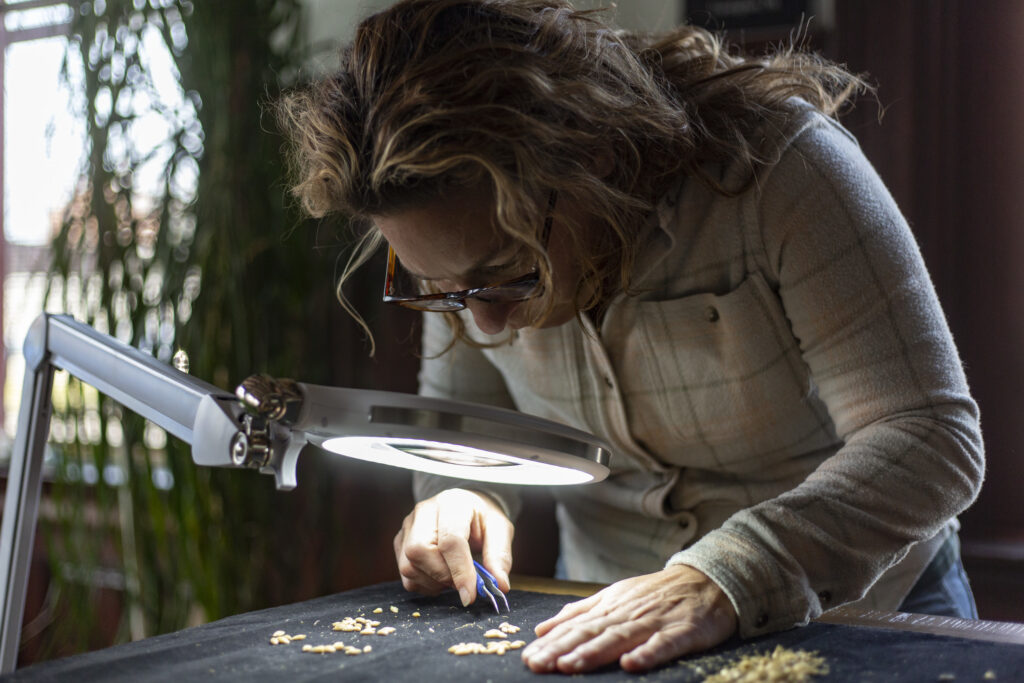
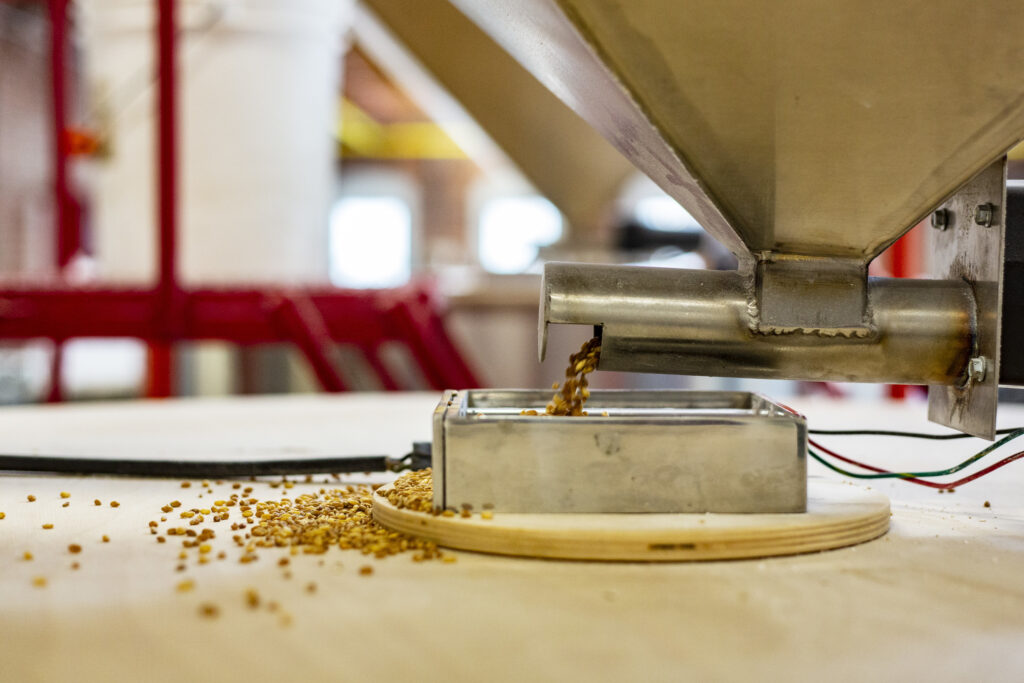
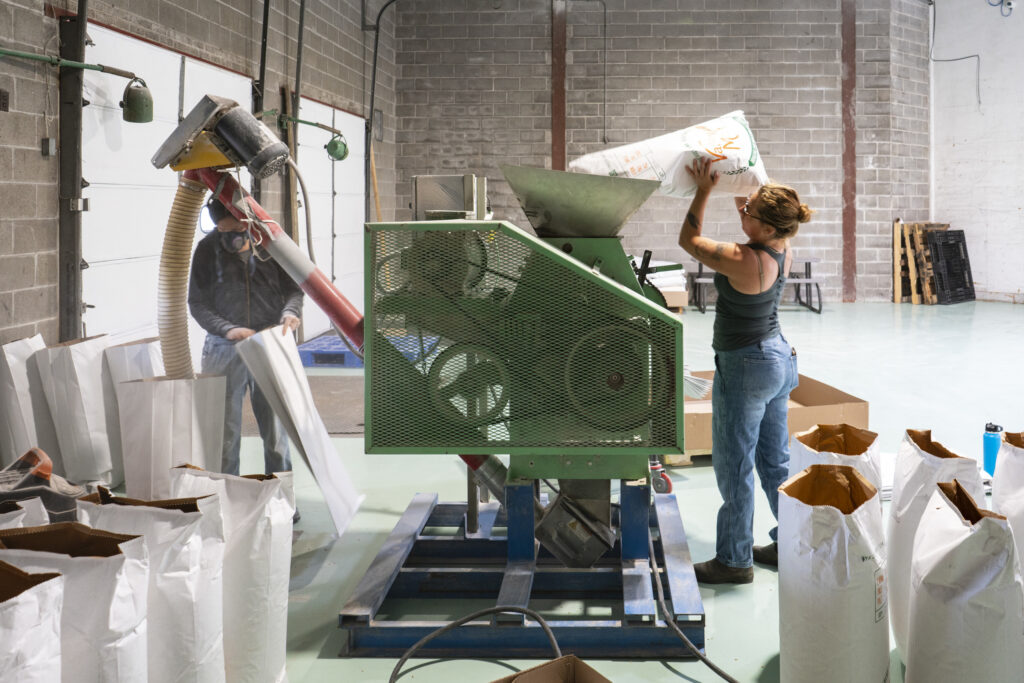
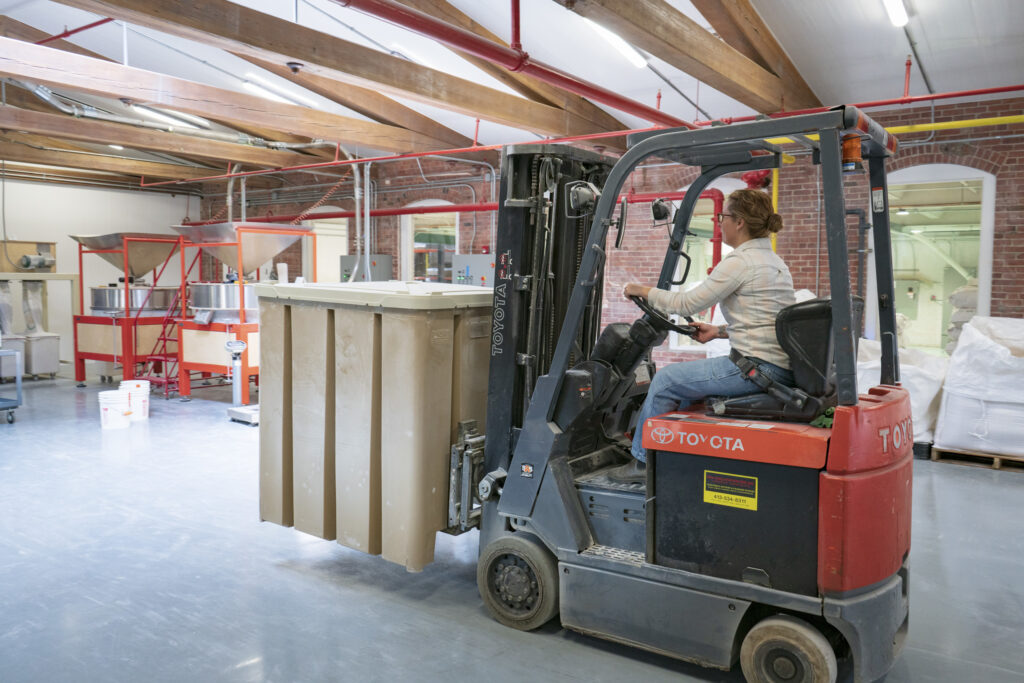
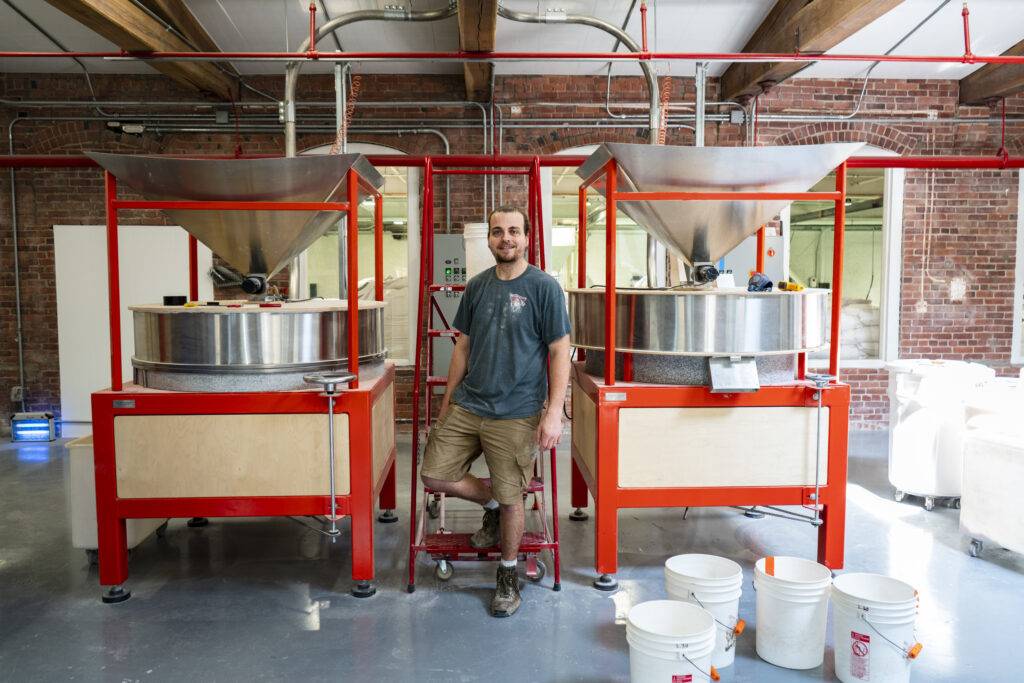
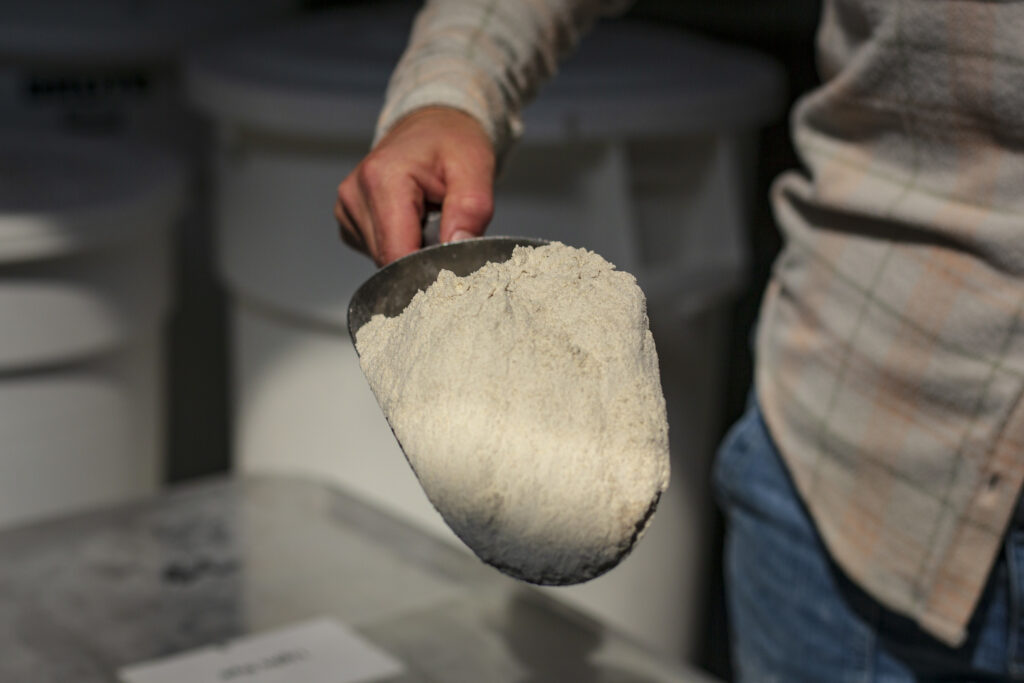
Ground Up grinds hard red winter wheat, hard red spring wheat, soft white winter wheat, barley, spelt, Danko rye, and conventional as well as organic and regenerative organic Wapsie Valley corn, all of which it sources from a collection of northeast farms within a 250-mile radius of their mill. From these, they have developed roughly ten bread, pizza, whole grain and all-purpose flours, as well as custom blends. In the past year, the company began making organic flour using wheat from a farm in New York that is certified as Regenerative Organic. Beyond ensuring that a product meets the USDA’s baseline criteria for being certified organic, this newer, “regenerative” designation certifies practices that focus on restoring the health of both the soil and the complete farm ecosystem.
The mill’s business is 80 percent wholesale. Clients range from micro bakeries (including licensed home kitchens) that purchase twenty to one hundred pounds of flour per week, to larger bakeries purchasing 250 to 500 pounds weekly, to even bigger accounts that require pallets of 2,000 to 2,500 pounds every three weeks or so. Roughly 10 percent of the business is retail at grocery stores and shops in Massachusetts, Rhode Island, Vermont, Connecticut, New Hampshire and New York, and the rest is online sales from groundupgrain.com.
The Stanleys purchased a second mill in 2020, when there was a pandemic-related flour shortage, and installed it in 2021. “It almost felt like an emergency, like we were a critical business,” Andrea recalls. The company, which had sold its flour only to bakeries until that point, offered contactless pickup of flour in Hadley to both individuals and businesses. Andrea says that many of their most avid home baker clients would purchase as much as fifty pounds of flour a month.
One of these clients, Jess Porter, has become a valued partner. Now culinary director at Appleton Farms, a Trustees of Reservations property in Ipswich, Porter first heard about Ground Up when she was teaching at a kneading conference in Skowhegan, Maine. She started working with the flour after attending a New England Grainshed Alliance symposium — a forum for farmers, bakers, maltsters, millers, restaurateurs, consumers and others interested in learning about and building awareness of locally grown grains. Porter had recently left a ten-year stint as bread production manager at A&J King Artisan Bakers in Salem. “The longer I was at A&J, the more interested in the science I became,” she says. “I learned that a great way to level up and challenge yourself is to work with regionally grown grains. There’s a learning curve. I was interested in the challenge there, and then I became interested in the mission behind it.”
Porter started teaching bread- and pizza-making classes at Appleton Farms in 2019, but when those shut down in the early days of the pandemic, she began baking “for the community” from her apartment. “You couldn’t find flour anywhere, couldn’t find bread on the shelves,” she says. She placed an order with Ground Up, and they hand-delivered the flour. By late spring, she launched a wood-fired pizza program at Appleton Farms, using Ground Up pizza flour. She says people were thrilled to be able to engage in a communal activity outdoors and eat delicious pizza with fresh vegetables.
“It was a slam-dunk deal to me. Our bakers actually prefer the consistency of the grain we are getting from them. It’s local. The customer service has been great. They tell us where all their grains are coming from.”
–John Goodman, co-owner of Clear Flour Bread
Jon Goodman, co-owner of Clear Flour Bread in Brookline, first encountered Ground Up at a Northeast Grainshed Alliance meeting. The Stanleys invited him to Hadley for a tour, and, he says, “It was a slam-dunk deal to me. Our bakers actually prefer the consistency of the grain we are getting from them. It’s local. The customer service has been great. They tell us where all their grains are coming from.” Ground Up worked with Clear Flour on the grind setting for the whole wheat and rye flours they use, and now the company custom-mills the flours for them. “We’re excited to be in business with people who are passionate about what they do, like we are,” says Goodman.
Porter, who helped Ground Up develop their bread flour and ancient grain blends, says the freshness of the company’s flour impacts the flavor of the finished product. “The sustainability aspect is important to me,” she adds. “We have a strong commitment to seasonality and to regenerative agriculture. That’s the thread that connects Ground Up.”
“People forget that wheat is plants,” she continues. “Flour comes from plants. We talk about it. ‘What makes the pizza crust so great? What makes the pie dough so great?’ We just preach about this flour.”


